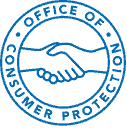Curbstoners
When you buy a used car from a private party, there is always the possibility that you are actually buying it from a "curbstoner." A curbstoner is a person who is in the business of selling used cars but doesn't want you to know that. The curbstoner wants you to think that he or she is a private individual selling his or her own personal car.
Why do curbstoners try to disguise themselves as private sellers? A person who is in the business of selling cars needs a license. The licensing laws protect consumers from fraud and abuse. Curbstoners do not have licenses to sell cars. They try to disguise themselves as private sellers so that you won't complain to consumer protection agencies and licensing authorities when you have problems with the car you purchased.
Many cars sold by curbstoners have problems. Some won't even pass inspection. Others may need expensive repairs. The Office of Consumer Protection has received complaints about curbstoners selling cars that have been wrecked, stolen, damaged in floods, or had their odometers rolled back to show lower mileage Curbstoners don't give warranties and may be difficult to find when you have a problem.
Warning Signs: When you are looking at a vehicle being sold by a private individual, the following are signs that you may be dealing with a curbstoner:
- The title is not in the seller's name.
- The car is being sold in Maryland with out-of-state dealer tags.
- The seller is vague in response to your questions about the car's history.
- The seller has more than one car for sale.
- The seller meets you at a location that is different from the address on the title and registration, such as a repair shop or gas station, parking lot, or vacant lot.
- The car does not have tags on both the front and the rear, or the tags or vehicle serial number do not match the numbers on the registration card for the car.
- The newspaper has several classified ads with the same phone number, but for different cars.
Buying a car from a curbstoner can be a big mistake and cost you thousands of dollars in repairs. Protect yourself by asking questions, checking out the seller, or buying from a licensed car dealer.
For more information:
